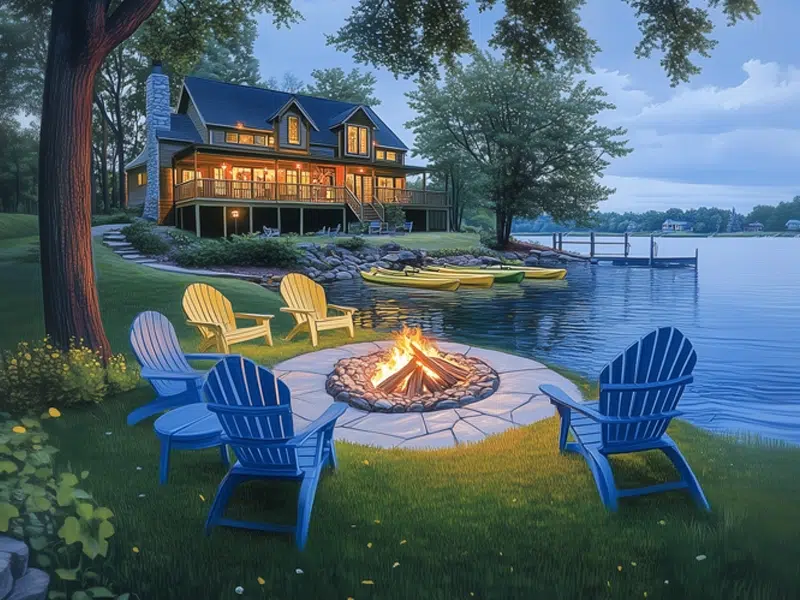Nebraska Short-Term Rental Regulations and Airbnb Laws
In Nebraska, the regulatory environment for short-term rentals is structured to balance the growth of the vacation rental market with the protection and satisfaction of hosts, their guests, and the community.
The state provides overarching guidelines while empowering local jurisdictions to craft specific regulations that align with their unique community needs, from zoning ordinances to health and safety protocols. This flexible framework supports the varied characteristics of Nebraska’s cities and towns, allowing for tailored approaches to short-term rental oversight.
Hosts in Nebraska are advised to acquaint themselves with state and municipal regulations to ensure their short-term rental practices are compliant and contribute beneficially to the local tourism sector.
Staying informed and compliant with the dynamic regulatory landscape is essential for short-term rental proprietors who wish to provide lawful and secure lodging options within Nebraska’s vibrant travel scene.
If you have questions about short-term vacation rentals in Nebraska, contact Proper Insurance. Our agents are experts in the vacation rental industry. Call 888-631-6680 today.

State-Imposed Regulations in Nebraska
Navigating the landscape of short-term rental regulations in Nebraska requires understanding both state-level mandates and local jurisdictional ordinances. Nebraska’s approach to short-term rental regulations is designed to create a balanced environment where hosts can offer accommodations without undermining the local housing market or community well-being. This section introduces the key state-level regulations affecting short-term rental operations.
Tax Obligations
One of Nebraska’s primary state-imposed regulations for short-term rental hosts revolves around tax obligations. Hosts are required to:
- State Sales Tax: Short-term rental incomes are subject to Nebraska’s sales tax. Hosts must collect this tax from guests and remit it to the state.
- Lodging Tax: A lodging tax may also apply to short-term rentals depending on the location. This is in addition to the state sales tax and must be collected and remitted by the host.
- State Registration: Hosts may be required to register with the Nebraska Department of Revenue and obtain a tax identification number to legally collect and remit taxes.
Licensing and Permits
Nebraska does not have a statewide licensing requirement for short-term rentals. However, hosts should still verify whether state-level regulations or registration processes apply to their short-term rental business situation. This might include:
- Health and Safety Inspections: Ensuring properties meet state-imposed health and safety standards, which could require inspections or adherence to specific codes. Even if this is not state-mandated for every situation, holding your short-term rental accountable to adequate health and safety standards is always a good practice.
- Insurance: Hosts should verify state insurance requirements for short-term rentals, ensuring their policy covers guest stays and any potential liabilities. Having liability insurance that covers short-term rental activities can protect hosts against claims for injuries or damages that occur because of the short-term rental business, whether on the property or off-premises, and whether it happens to the guest or as a result of the guest.
By understanding and adhering to these state-imposed regulations, hosts in Nebraska can operate their short-term rentals legally and successfully, contributing to the vibrant tourism economy while respecting community standards and obligations.
Local Jurisdiction Regulations in Nebraska
In Nebraska, the regulatory landscape for short-term rentals can significantly vary from one locality to another. Municipalities and counties have the authority to enact their own rules and regulations, which can complement or, in some cases, extend beyond state-imposed regulations.
Zoning and Land Use Laws
Local governments utilize zoning and land use laws to manage how properties within their jurisdictions can be used. For short-term rental hosts, this means:
- Zoning Restrictions: Certain areas may be zoned exclusively for residential use, potentially restricting the ability to operate short-term rentals. Hosts must check their local zoning ordinances to ensure their rental activities are permitted.
- Special Use Permits: Some jurisdictions may require hosts to obtain special use permits, allowing them to operate a short-term rental in areas where such activity is not typically permitted by right.
Licensing and Registration Requirements
Beyond state registration for tax purposes, local jurisdictions in Nebraska may have additional licensing or registration requirements for short-term rentals:
- Local Business Licenses: Hosts may need a business license to operate a lodging or short-term rental business within the municipality.
- Short-Term Rental Permits: Some areas require a specific short-term rental permit, which may involve an application process, a fee, and adherence to local regulations.
Health, Safety, and Building Codes
Ensuring the safety and well-being of guests is paramount. Local jurisdictions may impose requirements related to:
- Health and Safety Inspections: Vacation rental properties may be subject to inspections to ensure they meet local health and safety standards.
- Building Codes: Compliance with local building codes, including fire safety standards, emergency exits, and occupancy limits, is often required.
Community Relations
Local ordinances may also address potential impacts on neighborhoods and communities, including:
- Noise Ordinances: To minimize disturbances, hosts must ensure their guests adhere to local noise regulations, especially during nighttime hours.
- Parking Requirements: Adequate parking must be provided without infringing on parking availability for residents.
- Trash and Debris: Regulations may specify how and when trash should be disposed of to maintain cleanliness and public health.
Navigating Local Compliance
To successfully navigate local compliance, hosts should:
- Conduct Thorough Research: Consult local government websites, contact municipal offices directly, or seek information from local host associations to understand the specific regulations applicable to their short-term rental.
- Engage with the Community: Proactively engaging with neighbors and community members can help address concerns and foster a positive environment for guests and residents alike.
- Maintain Records: Keeping detailed records of licenses, permits, and compliance efforts can be beneficial in the event of disputes or inspections.
Understanding and adhering to local jurisdiction regulations is essential for operating a legal and successful short-term rental in Nebraska. By staying informed and proactive, hosts can navigate these requirements effectively, ensuring their operations contribute positively to the local economy and community well-being.
Other Considerations for Short-term Rentals in Nebraska
Hosts must navigate a complex web of state and local regulations when managing short-term rentals in Nebraska. Beyond these legal requirements, several other considerations can influence the success and sustainability of a short-term rental business. This section delves into those additional factors, offering insights into best practices for responsible and effective short-term rental management.
Insurance Coverage
Adequate insurance is crucial for protecting both the property and the host from potential liabilities and property damage associated with short-term renting. Standard Homeowners and Landlord policies may not cover activities related to short-term renting, so it’s essential to:
- Review Your Policy: Ensure that your insurance coverage specifically includes short-term rental activities. Even if you add a short-term rental endorsement, also known as a rider, there are still key areas where a Homeowners or Landlord/Dwelling policy falls short. When a property is used for short-term rentals, it straddles the line between a personal residence and a commercial operation, introducing massive coverage gaps for the insured.
- Upgrade Your Insurance: Proper Insurance leads the short-term vacation rental insurance market, having developed a specialty policy covering business and personal use of your property. This policy not only provides comprehensive protection against common exposures like liability, property damage, and loss of revenue, but it also includes enhancements tailored to the needs of short-term rental owners, like coverage for bed bugs/fleas, squatters, and guest theft/damage.
Neighbor Relations
Maintaining a good relationship with neighbors is vital for the long-term viability of a short-term rental. Hosts can take several steps to minimize potential friction:
- Communicate Your Intentions: Letting neighbors know about your short-term rental and providing contact information can help address concerns directly before they escalate.
- Implement House Rules: Establish clear house rules for guests, including noise restrictions, parking guidelines, and garbage disposal instructions, to prevent disturbances.
Dynamic Market Conditions
The short-term rental market is influenced by various factors, including tourism trends, economic conditions, and competition. Hosts should remain adaptable and informed about the market to ensure their offerings remain competitive and appealing:
- Market Analysis: Regularly analyze the local short-term rental market to understand pricing trends, guest preferences, and seasonal fluctuations.
- Continuous Improvement: Update your listing and property based on guest feedback and market demands to enhance appeal and increase occupancy rates.
Technological Tools and Platforms
Leveraging technology can significantly enhance the efficiency and effectiveness of short-term rental management. Consider using:
- Rental Platforms: Utilize reputable short-term rental platforms for listing your property, which can provide exposure to a wide audience and offer tools for managing bookings, payments, and reviews.
- Management Software: Consider investing in short-term rental management software to streamline operations, including scheduling, communication, and financial tracking.
Legal and Tax Compliance
Staying compliant with legal and tax obligations is an ongoing process that requires attention to detail and proactive management:
- Keep Records: Maintain thorough records of income, expenses, taxes paid, and any communications regarding your rental property.
- Seek Professional Advice: Consulting with legal and tax professionals can help ensure that you remain compliant with all regulations and take advantage of any applicable tax benefits.
Community and Environmental Impact
Responsible short-term rental hosts recognize the importance of their impact on local communities and the environment. Implementing sustainable practices and contributing positively to the local economy can enhance the reputation and success of your rental:
- Sustainability Practices: Implement eco-friendly practices such as recycling, energy-efficient appliances, and water conservation measures.
- Support Local Businesses: Encourage guests to explore local attractions, dine at local restaurants, and shop from local vendors, thereby supporting the local economy.
By considering these factors and adopting a holistic approach to short-term rental management, hosts in Nebraska can create a successful, sustainable business that benefits guests, the community, and themselves.
Nebraska Hosts: Help Keep Us Informed on Regulations in Your Area
We frequently update our regulations pages as new information or updates are brought to our attention. If you know of a short-term rental regulation or Airbnb law in the state of Nebraska or specific to a local jurisdiction, please contact us through email at info@proper.insure so we can include it on our page.
Upgrade Your Short-Term Vacation Rental Insurance Today
Interested in a policy to protect you and your business from liability and damage claims? Proper Insurance is the nation’s leading short-term rental insurance provider, protecting homes in all 50 states and replacing inadequate Homeowners/Landlord policies. Their comprehensive coverage meets or exceeds standard short-term rental requirements with $1M Commercial Liability (CGL) and unmatched protection for your property and revenue. Additional custom coverages include guest-caused theft/damage, amenity liability (bikes, kayaks, hot tub, etc.), bed bugs, fleas, squatters, and more.
Please note: The information provided is intended as a guide and may not be comprehensive or current. Regulations may change and could vary by area or situation. Always consult local authorities or a legal professional to ensure you have the most accurate information for your short-term rental property.



